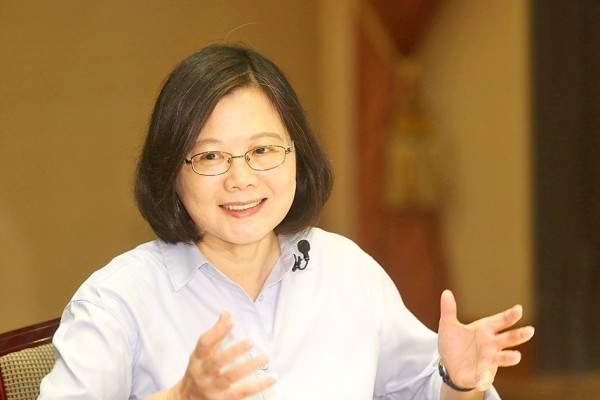《TAIPEI TIMES》 Tsai renews call for new model on cross-strait ties

President Tsai Ing-wen gestures during an interview with the Central News Agency in Taipei yesterday. Photo: CNA
CHANGING WORLD: Sticking to past practices and ways of thinking would make it hard for Taipei and Beijing to deal with volatile regional situations, the president said
/ Staff writer, with CNA
President Tsai Ing-wen (蔡英文) has reiterated her proposal that Taipei and Beijing create a new model to handle cross-strait relations, which have been at a standstill since her inauguration in May last year.
Taiwan hopes that both sides can begin to think about the matter after the conclusion of the Chinese Communist Party’s 19th National Congress, at which the party’s new leadership is to be elected, Tsai said in an interview with the Central News Agency published yesterday.
The week-long congress is scheduled to begin on Oct. 18.
The two sides of the Taiwan Strait have for many years dealt with their ties based on an established model and guidelines, which to a certain extent have helped maintain cross-strait stability, Tsai said.
However, in view of new international situations, they should consider whether there is a need to examine such old practices and mindsets, she said.
“If we keep sticking to these past practices and ways of thinking, it will probably be very hard for us to deal with the volatile regional situations in Asia,” Tsai said.
Unhappy that Tsai’s government has refused to recognize the so-called “1992 consensus,” Beijing has suspended official dialogue with Taipei since she took office.
The “1992 consensus,” a term former Mainland Affairs Council chairman Su Chi (蘇起) in 2006 admitted making up in 2000, refers to a tacit understanding between the Chinese Nationalist Party (KMT) and the Chinese government that both sides of the Taiwan Strait acknowledge that there is only “one China,” with each side having its own interpretation of what “China” means.
Beijing has insisted that the Tsai administration explicitly accept the “1992 consensus” — which in effect says that Taiwan is part of China — as the political foundation for the continuation of relatively warm relations under her predecessor, former president Ma Ying-jeou (馬英九).
However, Tsai has only been willing to say that she respects the historical fact that cross-strait talks took place and that some understanding was reached.
Both sides have made considerable efforts to maintain cross-strait stability over the past 16 months, Tsai said, but added that on major political issues, “they feel we have not reached their expectations, but we have already shown the utmost goodwill.”
She reiterated that the viewpoints outlined in her inaugural address would remain her principles in dealing with cross-strait ties.
In her inauguration speech, Tsai promised that her administration would work to maintain the existing mechanisms for dialogue and communication across the Taiwan Strait and would conduct cross-strait affairs in accordance with the Republic of China Constitution, the Act Governing Relations Between the People of the Taiwan Area and the Mainland Area (臺灣地區與大陸地區人民關係條例) and other relevant legislation.
She also recognized that “there was joint acknowledgement of setting aside differences to seek common ground” in the 1992 talks between representatives of Taipei and Beijing.
In the interview, Tsai said she did not see Premier William Lai’s (賴清德) comments in open support for Taiwanese independence at the Legislative Yuan on Tuesday last week as affecting cross-strait relations.
Lai is fully aware of the government’s overall policy goals and understands very well “what the limits are,” she said.
Regarding the nation’s military readiness, Tsai said the government would increase its defense spending gradually over the next few years to provide the armed forces with stable financial resources to support efforts to develop a plan to increase the nation’s combat capacity in the next decade.
新聞來源:TAIPEI TIMES















